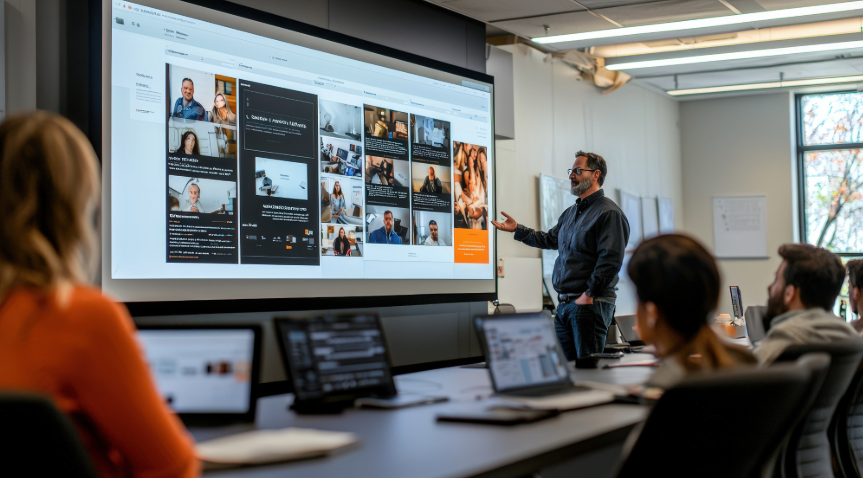Digital marketing changes fast. Keeping up with digital marketing trends in 2025 is crucial for success, especially for SaaS companies. This post explores key digital marketing trends, giving you the insights to adapt and thrive.
1. AI and Machine Learning: The Personalized Future
Artificial intelligence (AI) and machine learning (ML) are transforming marketing personalization. AI analyzes customer data, predicts behavior, and creates more targeted campaigns. AI tools, such as Jasper and ChatGPT, generate various forms of AI-generated content for diverse social media platforms and optimize content workflows.
Other tools automate tasks like email marketing and lead nurturing. This allows marketing teams to spend time on strategy, which enhances customer experience.
2. Voice Search Optimization: Speaking Your Audience’s Language
More people use voice search on devices like Alexa and Siri. Optimizing content for conversational, natural language queries is more important than ever. Consider how people phrase spoken questions, targeting relevant keywords for smart speakers and virtual assistants.
Think about long-tail keywords. These are longer, more conversational phrases people use in voice searches. For example, instead of “best coffee,” someone might ask, “Where’s the best coffee shop near me?” Optimize for voice search by using natural language and understanding real-time engagement. This shift changes search engine optimization.
3. Video Marketing Dominance: Lights, Camera, Engage.
Video marketing is already huge, set to become even more dominant in 2025. Short, engaging videos, particularly short-form videos like YouTube Shorts and Instagram Reels, on platforms like TikTok and Reels capture attention effectively.
Live streaming connects with your audience in real-time. It’s a great platform for new product launches and Q&A sessions. Tools like InShot and Canva simplify creating professional-quality videos.
A Wyzowl report shows videos boost sales and leads. User-generated content (UGC) videos perform exceptionally well, achieving significantly higher click-through rates than regular ads.
4. Augmented Reality (AR) and Virtual Reality (VR): Experiences That Wow
AR and VR aren’t just for entertainment. They offer valuable marketing opportunities for brands like IKEA and Sephora, transforming shopping experiences.
IKEA’s AR app lets customers “place” furniture in their rooms virtually. Sephora uses AR for virtual makeup try-ons. These innovative experiences elevate customer expectations.
5. Data Privacy and Security: Building Trust in a Transparent World
Data privacy is paramount. Regulations like GDPR mandate businesses to prioritize privacy. Transparency and compliance with data laws are crucial.
Google’s decision to retain third-party cookies in Chrome impacts the privacy landscape. While a cookieless future is still on the horizon, this extension gives marketers more time to develop effective, privacy-centric solutions, potentially leveraging first-party data strategies.
6. Social Commerce: Shopping Where We Scroll
With a growing percentage of online purchases occurring on social media, in-app shopping is booming. Shopping features are integrated into apps like Instagram, TikTok, and Facebook, streamlining purchasing for enhanced customer engagement.
Shoppable posts and ads convert browsers into buyers directly within these platforms.
7. Influencer Marketing: Going Niche for Real Impact
The creator economy continues to expand. Working with micro-influencers who cultivate dedicated followings builds trust and connection with their audience. Micro-influencers help you refine content, driving higher engagement on relevant media platforms.
Smaller audiences allow for more focused messaging. Micro-influencers often have deep, authentic relationships with their followers, driving strong engagement rates.
8. Sustainability and Ethical Marketing: Values That Resonate
Sustainability is good for business. Global events like COP30 highlight the ongoing importance of sustainability. This impacts shopper’s habits as they consider a company’s ethics, environmentalism, and business practices.
Consumers hold brands accountable, valuing authenticity and transparency. Sustainable brands tend to have more loyal followings. Media strategies and social media trends are adapting to accommodate growing interest in these values.
Digital Marketing Trends 2025: Navigating the Evolving Landscape

These digital marketing trends for 2025 signify more than mere technological advancements. They represent shifts in how brands communicate, sell, and connect with their customers.
Integrating emerging technologies with customer values will help SaaS brands thrive. Content marketing, including utilizing generative AI tools and interactive content to enhance customer service and generate dynamic content, is increasingly crucial for building credibility. Content creation also helps your SaaS brand be found on media platforms and through search engines. Game marketers also find that a strong content strategy captures attention across various digital channels.
Most organizations have integrated their content strategies, seeing significant sales increases as a result. Content strategies must account for dynamic content and AI-driven content for increased efficiency. Content workflows must adapt to integrating AI and include utilizing AI tools such as generative AI tools and incorporating party data effectively.
FAQs about digital marketing trends 2025
What is the future of digital marketing in 2025?
The future of digital marketing in 2025 centers around personalized experiences powered by AI. It also includes voice search optimization, engaging video content, immersive AR/VR, robust data privacy, social commerce, influencer collaborations, and sustainability. This trend balances advanced personalization through emerging technologies with ethical considerations.
What will digital marketing look like in 2030?
Predicting 2030 with certainty is difficult. Current trends suggest a greater reliance on the metaverse and Web3, along with even deeper hyper-personalization blurring real and digital boundaries.
As environmental awareness increases and data regulations tighten, transparency and robust data privacy solutions will become even more critical. Utilizing artificial intelligence is likely to revolutionize marketing data analysis and create increasingly advanced personalization.
What is the SEO strategy for 2025?
SEO in 2025 needs to anticipate changes. These changes include zero-click marketing (no website clicks from a search engine results page). It will also involve semantic SEO, Core Web Vitals, and voice search.
User experiences and SERP features like Answer Overviews are also evolving. Effective SEO strategies will need to keep pace with these shifts, focusing on longer keywords and natural language.
What does the future of digital marketing look like?
The future of digital marketing appears bright. More targeted strategies will personalize brand experiences, increasing conversions and engagement. Brands will grow through data-driven insights and authentic, sustainable practices.
Conclusion
Digital marketing trends for 2025 highlight the critical need for adaptation and innovation. The future blends technology with human values, offering exciting opportunities for SaaS companies to connect with their audience on a deeper level. These changes impact marketing strategies for companies, marketing teams, and even influencers on platforms such as social media.
I’d love to hear your thoughts. What other digital marketing trends are you anticipating, and how can SaaS businesses capitalize on these shifts? Let’s talk more about the potential of dynamic content, short-form video, and other media trends.
The evolving landscape of digital marketing emphasizes the importance of a well-crafted marketing strategy tailored to emerging trends. SaaS companies, in particular, can benefit from integrating innovative approaches such as AI-driven personalization, enhanced analytics, and interactive content into their campaigns. Social media continues to play a pivotal role, with short-form videos and dynamic content standing out as key drivers of engagement and brand awareness.
As these trends reshape the digital marketing sphere, a thoughtful marketing strategy allows businesses to stay ahead of the curve. By aligning technological advancements with audience expectations, SaaS companies can create impactful campaigns that resonate and drive long-term growth.

